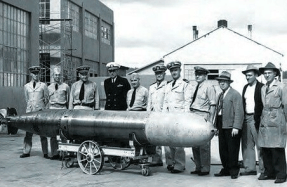WHAT TO MAKE OF SS GENERAL KARL WOLF?

During World War II, direct contact between Nazi and Allied leaders was vanishingly rare. Two particularly dramatic exceptions occurred just before turning points in the war, both aimed at brokering a peace agreement. Deputy Führer Rudolf Hess made the best-known such contact, a year and a half into the fighting. The second, coming near the war’s end and far less remembered, was the work of an SS general named Karl Wolff, who invoked Hess, and left a host of troubling—and still-unsettled—questions in his wake.
In May 1941, as Germany was preparing to invade Russia, Hess secretly strapped himself into a Messerschmitt Bf 110 fighter-bomber, flew fast and low under the radar from Germany to Scotland, and parachuted very near his target, the estate of the Duke of Hamilton. His plan was for the duke—whom Hess claimed to have met at the 1936 Olympics—to put him in touch with the king, who in turn would arrange peace between Britain and Germany, allowing Hitler to focus on the East.
No one appreciated Hess’s sincere but delusional gesture. The duke claimed he did not remember meeting Hess. Even if they did meet, hardly anyone in England, the duke and king included, was willing to make peace with Hitler—who himself was unwilling to let anyone else make foreign policy. When told about Hess’s venture, Hitler let out a cry of surprise and rage, and came close to living up to his reputation as a “Teppichfresser”—a madman who gnawed on carpets. Prime Minister Winston Churchill, who was initially nonplussed—Was this really the Deputy Führer? Was he acting on his own?—ordered Hess locked up. Somewhat sympathetic to Hess for trying to make peace, the prime minister directed that he spend the rest of the war in isolation but relative comfort; Hess went from the Tower of London to a fortified mansion in the countryside and then to a hospital in Wales, where he spent three years.

Wolff’s turn at peacemaking came in the last weeks of the war. Since late 1943 he had been the senior SS commander in Italy—essentially the Reich’s chief enforcer in that theater. His title was fearsome: SSObergruppenführer and General of the Waffen SS, Highest SS and Police Leader and Military Plenipotentiary of the German Armed Forces. He did not have as much military power as his Wehrmacht counterpart, who commanded more than three quarters of a million soldiers, sailors, and
You’re reading a preview, subscribe to read more.
Start your free 30 days





